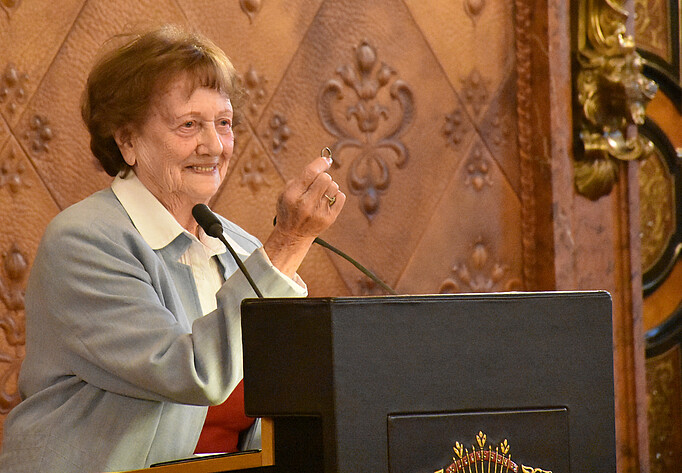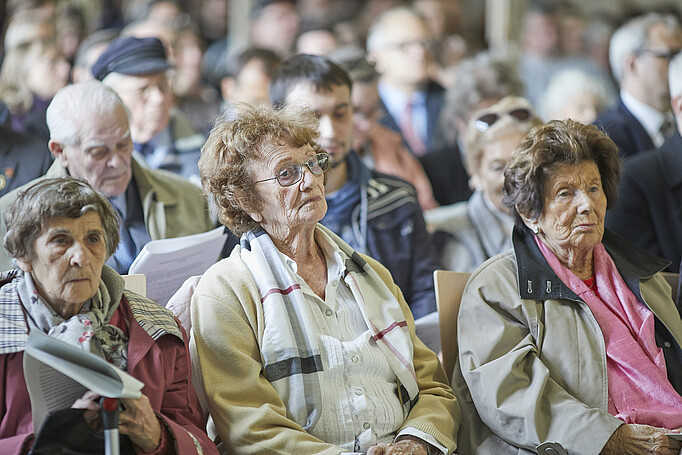04/07/2021 Report
Dita Kraus: Night thoughts
When 91-year-old concentration camp survivor Edith (Dita) Kraus fell ill with Corona and had to be treated in hospital for several weeks, she produced a text in which she writes about her memories and thoughts of Auschwitz.
Born in Prague in 1929, Edith (Dita) Kraus was persecuted by the National Socialists as a Jew. Dita survived the concentration camps Auschwitz and Bergen-Belsen as well as three subcamps of the Neuengamme concentration camp. Her parents did not survive. Today Dita Kraus lives in Netanya/Israel. Last year, the book "Ein aufgeschobenes Leben", jointly published by the Foundation of Hamburg Memorials and Learning Places and the Lower Saxony Memorials Foundation, was published by Wallstein-Verlag. In February, Dita Kraus spent several weeks in hospital with a corona infection. There she wrote the following text, which was also printed in the magazine "Der Spiegel" in April 2021:
Night thoughts.
The many hours in the hospital bed, neither asleep nor awake, in a kind of half consciousness my mind dives into the dark cellars of memory. Here they are, the memories, locked away decades ago, too horrible to be faced. They fill my state of semi-sleep and I am unable to get rid of them.
The gas chambers. What’s that? People say they did not exist. It was something to do with the Holocaust. A kind of Jewish myth. In that war, somewhere in Europe. Who cares, it was so long ago!
But my memories keep knocking: Out ! Out! It must be told!
No, no, stay there, I can’t. Nobody can bear it.
But those words I read years ago, written by a Sonderkommando man in Auschwitz, those words demand to be heard. They are horrible beyond endurance, but must be told. I don’t remember the name of that man, nor his exact words.
“…by some mistake in the schedule, the crowd of naked men in the corridor encountered the column of naked women, waiting to be herded into the gas chamber. One of the men recognized his wife, rushed to her and clung to her in a tight embrace, until the guard beat them apart and pushed the woman with the others into the chamber…… “
“The regular procedure was as follows. In an ante chamber the prisoners had to undress and were shoved into the gas chamber until there was no more space. The Iron door was banged shut. The vents in the ceiling were opened, allowing the Cyclon B gas to enter the washroom-like space. Screaming, coughing and choking, the tangled mass of bodies heaved and writhed. Mothers held their babies up to be nearer the vents, so their suffering should be shorter. The guards watched from above through loopholes, until there was no more movement. It took about twenty minutes, sometimes longer.”
The bodies were then dragged out by the Sonderkommando men. They cut the hair of the dead women and girls and knocked out their gold teeth. The guards watched them closely, lest a gram of the precious gold disappear in their palms. Afterwards the bodies were cremated or buried in mass graves.
The ashes of the victims were scattered in the vicinity. The smoke from the crematoria chimneys also contained ashes, which would fill the air like snowflakes. They mingled with the soil of the entire area.
Nowadays thousands of visitors tread the ground of the Auschwitz Memorial, unaware that it contains the ashes of the dead.
I am glad that my parents didn’t die in the gas chambers. It was my father’s good fortune that he died before the selections of Dr. Mengele. I am therefore spared the horror of imagining his death in the gas chambers. But my husband Otto’s father Richard wasn’t spared. He remained in the camp and died in the gas chambers with all those who did not pass the selections.
Otto’s father was an amateur tenor. He sang arias from operas at Charity events or parties, which made Otto feel ashamed. But in later life Otto felt sorry that he had hurt his father. When he heard an aria on the radio which his father used to sing, he would sigh deeply with sorrow and regret.
But I , who didn’t know his father, think of his death and feel that I am choking.
Dita Kraus, February 2021


